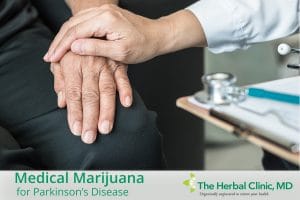Medical Marijuana and Parkinson’s Disease
What is Parkinson’s disease?

How can medical marijuana help patients who suffer from Parkinson’s disease?
As of today, there is still no cure for Parkinson’s disease. However, more and more patients are turning to an alternative form of Parkinson’s disease medication than what has been prescribed in the past. Medical marijuana (or cannabis) has garnered a strong public following for its therapeutic properties in treating many different diseases, including the symptoms of Parkinson’s. There are cannabinoid receptors scattered all throughout the brain. A very strong concentration of them lie in the basal ganglia, which is a region of the brain important to Parkinson’s. In the basal ganglia lies the globus pallidus and the substantia nigra pars reticulate. These 2 regions are some of the most densely concentrated cannabinoid receptor areas in the human body. So it isn’t a half-baked hypothesis to claim that a drug zeroed in on these receptors can have a positive effect on the symptoms of Parkinson’s disease. Historically, this is also not the first time cannabis has been used to treat symptoms of Parkinson’s.
Marijuana has been used to treat Parkinson’s as early as the 19th century. During those times cannabis tinctures were given to patients to combat involuntary movements and tremors prior to scientific breakthroughs such as the discovery of dopamine itself, and its effect on motor function. Nowadays many patients are smoking cannabis more to achieve the same effect. Studies have shown improvement in symptoms of Parkinson’s that include; tremors, rigidity, bradykinesia (slow movement), and quality of sleep and pain scales.
Is medical marijuana legal in Florida?
The Florida Medical Marijuana Legalization Initiative (also referred to as Amendment 2) was approved on the November, 2016 ballot. As a result, it is now legal to treat patients with medical cannabis for Parkinson’s in the state of Florida, and is on the rise as one of the most patient-preferred Parkinson’s disease medications. The Florida Medical Marijuana Legalization Initiative (also referred to as Amendment 2) was approved on the November, 2016 ballot. Patients need only acquire a medical marijuana card prior to seeking out a dispensary to accommodate their needs.
Medical Marijuana for Parkinson’s Disease in Florida
For questions about medical marijuana in Hudson, Tampa, or Beverly Hills, FL click here. Alternatively, you can call us on 727-202-4325. We’re standing by to answer questions and to improve your quality of life.
